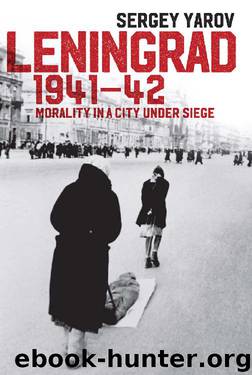Leningrad 1941 - 42: Morality in a City under Siege by Sergey Yarov

Author:Sergey Yarov [Yarov, Sergey]
Language: eng
Format: epub, azw3
ISBN: 9781509508020
Publisher: Wiley
Published: 2017-07-24T04:00:00+00:00
The paramedics, when they arrived, roughly shoved him into the ambulance, and that was the last Irina saw of him. She could not locate him in either the mortuaries or the hospitals, and even suspected the paramedics had gone through his pockets and then just thrown him out of the ambulance. Her daughter failed to save the baby, and the whole sad story encapsulates the destruction, but also the tenacity with which those trapped in the siege fought death to the last.
6
The main measure of a person’s charity was their preparedness to share bread. No Leningrader had any to spare, so the gift meant they were donating a portion of an already meagre ration. They shared everything with their families: food, firewood, hot water. The gifts were often minuscule: ‘a small sugar lump’, ‘some crumbs of bread’, ‘a sliver of butter’, ‘the crumbs from his ration’, ‘a piece of biscuit’.39 But those receiving them understood they were being given all that someone had to give. Belongings were sold, sometimes even the most precious, for next to nothing, to help loved ones. Food surrogates were shared: jelly made from wood glue, fritters of wallpaper paste, cattle feed, skins, oilcake – whatever anyone had to spare.
Not everyone was generous, however. Relatives stole the ration cards from starving people too weak to defend themselves, thereby condemning them to death. Concealing it from their starving family members, and sometimes robbing them outright, there were some who obtained food and did not share it, or who could not resist eating another person’s ration. ‘There were cases where old people were given no food at all. “You’re going to die anyway”, they would be told, “so it is better for you to save your grandchildren”’, V. E. Skorobogatenko, the Central Committee Party administrator at the Elektrosila [Electric Power] factory, noted.40 There were instances of violence, sometimes between the most closely related people: husbands, wives, children, parents, brothers, sisters.41 ‘Even at home I was afraid that someone in the family would steal my bread’, recalls Alexandra Zmitrichenko.42 Few people would have been surprised at the time by the admission of one Leningrader that she took her grandmother’s bread, even though the old lady was hungry and crying: ‘As for me, offer me everything and I’d eat it. I had no pity for anyone. All those feelings got blunted.’43
Families with members serving in the army in the vicinity of Leningrad stood a better chance of support. Many service personnel did not immediately discover just how badly their families were suffering. The censors firmly deleted from letters all mention of starvation. Those fighting on more distant fronts were likely to know even less about the calamity which had befallen Leningrad, and their families also appealed to them for help. The soldiers shared everything, from bread to horse meat; sometimes they even handed over their military food entitlement certificate. There was a kind of redistribution of food, from the less hungry to those on the verge of starvation, from those
Download
Leningrad 1941 - 42: Morality in a City under Siege by Sergey Yarov.azw3
This site does not store any files on its server. We only index and link to content provided by other sites. Please contact the content providers to delete copyright contents if any and email us, we'll remove relevant links or contents immediately.
| Africa | Americas |
| Arctic & Antarctica | Asia |
| Australia & Oceania | Europe |
| Middle East | Russia |
| United States | World |
| Ancient Civilizations | Military |
| Historical Study & Educational Resources |
The Radium Girls by Kate Moore(12017)
100 Deadly Skills by Clint Emerson(4920)
Rise and Kill First by Ronen Bergman(4778)
The Templars by Dan Jones(4681)
The Doomsday Machine by Daniel Ellsberg(4484)
The Rape of Nanking by Iris Chang(4202)
Killing England by Bill O'Reilly(3995)
Stalin by Stephen Kotkin(3956)
Hitler in Los Angeles by Steven J. Ross(3942)
12 Strong by Doug Stanton(3541)
Hitler's Monsters by Eric Kurlander(3328)
Blood and Sand by Alex Von Tunzelmann(3194)
The Code Book by Simon Singh(3177)
Darkest Hour by Anthony McCarten(3119)
The Art of War Visualized by Jessica Hagy(3000)
Hitler's Flying Saucers: A Guide to German Flying Discs of the Second World War by Stevens Henry(2744)
Babylon's Ark by Lawrence Anthony(2671)
The Second World Wars by Victor Davis Hanson(2521)
Tobruk by Peter Fitzsimons(2507)
